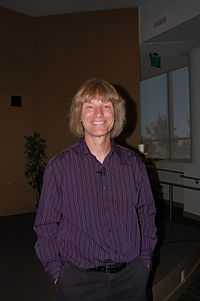Scott Meyers

Scott Douglas Meyers is an American author and software consultant, specializing in the C++ computer programming language. He is known for his Effective C++ book series. He is a frequent speaker at conferences and trade shows. He holds a Ph.D. in computer science from Brown University and M.S. in computer science from Stanford University.[1]
Meyers has expressed opposition to asking programmers to solve design or programming problems during job interviews, making him a minority [citation needed] in this camp:
"I hate anything that asks me to design on the spot. That's asking to demonstrate a skill rarely required on the job in a high-stress environment, where it is difficult for a candidate to accurately prove their abilities. I think it's fundamentally an unfair thing to request of a candidate."[2]
Meyers conceived and, with Herb Sutter, Andrei Alexandrescu, Dan Saks, and Steve Dewhurst, co-organized and presented the boutique (limited-attendance) conference, The C++ Seminar, which took place three times in 2001-2002. In 2010, he conceived and, with Sutter and Alexandrescu, co-organized and presented another boutique conference, C++ and Beyond[3] which was again organized in 2011, 2012, and 2013.
In March 2009, Meyers was awarded the Dr. Dobb's Journal Excellence in Programming Award.[4]
Publications
- 1992. Effective C++: 50 Specific Ways to Improve Your Programs and Designs. ISBN 0-201-56364-9[5][6]
- 1995. More Effective C++: 35 New Ways to Improve Your Programs and Designs. ISBN 0-201-63371-X
- 1998. Effective C++, Second Edition: 50 Specific Ways to Improve Your Programs and Designs. ISBN 0-201-92488-9
- 2001. Effective STL: 50 Specific Ways to Improve Your Use of the Standard Template Library. ISBN 0-201-74962-9
- 2005. Effective C++, Third Edition: 55 Specific Ways to Improve Your Programs and Designs. ISBN 0-321-33487-6[7]
- 2010. Overview of The New C++ (C++11). Annotated training materials published by Artima Press. No ISBN.
- 2010. Effective C++ in an Embedded Environment. Annotated training materials published by Artima Press. No ISBN.
References
- ↑ Venners, Bill (16 December 2002). "Multiple Inheritance and Interfaces: A Conversation with Scott Meyers, Part I". Artima.
- ↑ "How to Interview a Programmer" from Artima Developer
- ↑ C++ and Beyond conference website
- ↑ "Dr. Dobb's 2009 Excellence in Programming Award"
- ↑ Prata, Stephen (2001-11-01). C++ Primer Plus. Sams Publishing. pp. 1029–. ISBN 9780672322235. Retrieved 4 July 2012.
- ↑ Allison, Chuck (May 01, 1999). "Review of Scott Meyers' Effective C++ Compact Disk". Dr Dobb's Journal. Retrieved 4 July 2012.
- ↑ "Effective C++, Third Edition". Slashdot. June 7, 2005. Retrieved 4 July 2012.
External links
- Official website
- The Keyhole Problem Paper in PDF format